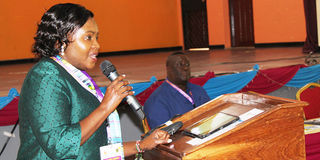Mainstreaming STEM in TVET: Efforts by Kenya Coast National Polytechnic to encourage female learners
Sponsored by Kenya Coast National Polytechnic

Kenya Coast National Polytechnic Chief Principal, Mrs Anne Mbogo.
By Michael Njogah, Chairperson for Research, Innovation and Alumni Committee at KCNP
Kenya is undertaking a national curriculum reform. This includes the work of the recently appointed Presidential Working Party on Education Reform to study, assess, and make recommendations on the implementation of basic, secondary, and tertiary education. The objective is to align the education sector with the current industry needs.
On tertiary and university education, the taskforce is expected to review and recommend a governance and financing framework for TVET training and development, among other responsibilities.
The key objectives of the review at this level is to strengthen science, technology, engineering and mathematics (STEM), and to address gender imbalance in these subjects.
This is informed by the fact that women’s participation in the STEM fields at tertiary education and subsequently the labour market, remains low. A cautious reform of STEM to attract more girls is necessary, at both policy and institutional levels.
According to UNESCO Institute for Statistics (UIS), Kenya had a total enrolment of 257,139 in TVET institutions, with 56.2 percent being male and 43.8 percent female. Gender disparities are more prevalent in some fields than others, with girls and women particularly being under-represented in STEM subjects at 35 percent globally (UNESCO, 2018).
Further, UNESCO (2018) recommended that governments should promote gender equity through legislation, policies, quotas, and financial incentives that support women. One of the strategies entails creating scholarships and fellowships reserved for female students to encourage more of them to pursue STEM courses.
The Kenya Coast National Polytechnic (KCNP) is already implementing a proactive gender sensitisation programme supported by the Kenya Education for Employment Programme (KEFEP), known as WITED (Women in Technical Education).
The Polytechnic, through the office of the Deputy Principal for Academic Affairs, is involved in the sensitisation of female trainers and trainees on STEM activities. KCNP has made visits to the various secondary schools, and has invited others to its facilities, to help students make well-informed career choices on TVET and STEM.
A gender committee that guides female trainees on STEM choices is in place to undertake the following responsibilities:
- Adopt measures to increase access to and retention of women and girls, as well as special interest groups, in STEM;
- Strengthen the existing policies, regulations, and practices on enrolment and recruitment of female trainees, including people with disabilities and individuals from marginalised communities;
- Apply affirmative action for women trainers and trainees for STEM courses;
- Promote mentorship and apprenticeship among women, girls, and boys within KCNP;
- Institute programmes that sensitise schools to encourage women, men, girls, and boys to challenge socio-cultural beliefs and retrogressive practices that breed inequality in enrolment, retention and transition to labour markets, for female trainees.
Details about how KCNP is advancing the mission to inspire more female students to study STEM are available here.

KCNP Applied Sciences students during a practical session.


